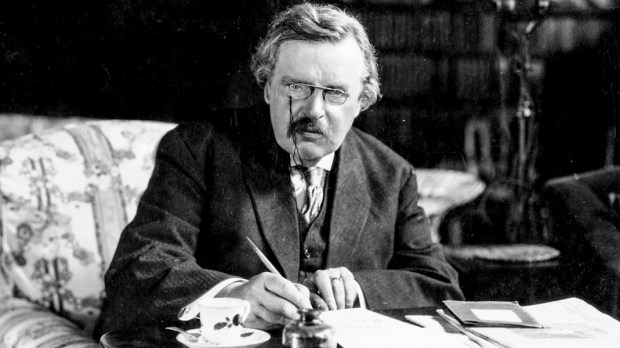There is a particular style of humor that is very distinctly Catholic. It’s shocking, and ironic. It is often paradoxical, too, quite in keeping with the teachings of the Church’s founder, who said, “love your enemies” and “the first shall be last, and the last shall be first.”
As G.K. Chesterton reminds us, “a paradox is an apparent contradiction containing a deeper truth.” If the dox doesn’t contain a deeper truth, then it’s not a paradox.
Chesterton was the “Prince of Paradox” and he could often best a thousand-word argument with the observation of one breathtaking twist of a paradox. On feminism Chesterton wrote, “Thousands of women marched in the street, chanting ‘we will not be dictated to!’ Then, they set out to become stenographers.”
This paradox contains truth, as opposed to a statement like, “Feminism is cancer,” which contains no truth. Additionally, his observation showcases a startling wit.
To Chesterton, comedy could not be separated from truth. Consider the definitions he provides for “wit” and “humor”:
Wit is always connected with the idea that truth is close and clear. Humor, on the other hand, is always connected with the idea that truth is tricky and mystical and easily mistaken. Wit is as abstract as algebra. It is a logical weapon very valuable to truth. But, Humor depends on human beings. Therefore, on special, separate human beings. Therefore, wit is international. While humor is national. (From George Bernard Shaw)
Wit is universal. All nations recognize irony and surprise, but not all nations share the same humor. As Chesterton says, “humor depends on special, separate human beings.” Former Trump Press Secretary Sean Spicer is a special, separate human being. An SNL skit where comic actress Melissa McCarthy impersonates Spicer makes Americans laugh, while it might not entertain the Japanese. Until McCarthy-as-Spicer pulls out a water gun and starts shooting at White House reporters. That absurd but witty bit — pew, pew, pew — is shocking, and has a universal appeal to humor, founded in the truth that everyone knows: that no Press Secretary would ever do such a thing.
Truth is ironic and shocking and it can be downright hilarious, as it often is when Catholicism meets the world:
- The Catholic is told that his theology is all about death, even as he proclaims life everlasting.
- Catholics refer to celibate priests (and some celibate nuns) as “Father” and “Mother.”
- The Catholic hears that his faith stifles freedom, even as Chesterton accurately wrote. “His faith gives man enough freedom to fall. And, God enough freedom to die.”
- Told that Catholicism, which resists times and trends, is “dead,” Chesterton replies, “A dead thing can go with the stream, but only a living thing can go against it.” And reminds the world that “We have a God who knows his way out of the grave.”
Christ always has the last laugh.
When we subordinate ourselves to divine truth, we gain mirth. As Chesterton wrote: “A man’s wit overpowers his enemies but his mirth overpowers him.” Mirth is the ability to laugh at oneself. Mirth is a Christian quality. As Chesterton concludes in Orthodoxy (1908):
There was something that he hid from all man when he went up a mountain to pray. There was something that he covered constantly by abrupt silence or impetuous insulation. There was some one thing that was too great for God to show us when he walked upon our earth; and I have sometimes fancied that it was his mirth.
The book Orthodoxy is an ironic, shocking joke. Chesterton set out to create a new religion based on common sense, only to discover that someone else had already created this new religion 1,800 years earlier. He discovered it by arriving at the ultimate paradox: the cross, and confronting a God humble enough to die.
No paradox is more shocking. No comedy is greater: The most widely read author in history, who wrote nothing down. Fully man and fully divine. Our dox is a shocking and hilarious paradox; but lest we forget, it is orthodox, too.

